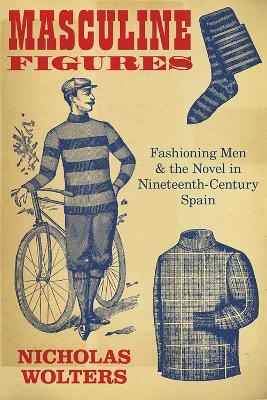
Masculine Figures
Fashioning Men & the Novel in Nineteenth-Century Spain
Seiten
2023
Vanderbilt University Press (Verlag)
978-0-8265-0517-0 (ISBN)
Vanderbilt University Press (Verlag)
978-0-8265-0517-0 (ISBN)
Based on years of archival research in Madrid and Barcelona, this interdisciplinary study offers a fresh approach to understanding how men visualized themselves and their place in a nation that struggled to modernize after nearly a century of civil war, colonial entanglement, and imperial loss. Masculine Figures is the first study to provide a comprehensive overview of competing models of masculinity in nineteenth-century Spain, and is particularly novel in its treatment of Catalan texts and previously unstudied evidence (e.g., department store catalogs, commercial advertisements, fashion plates, and men’s tailoring journals).
Fictional masculinity performs a symbolic role in representing and negotiating the contradictions male novelists often encountered in their attempts to professionalize not only as writers, but also as businessmen, professors, lawyers, and politicians. Through specific and recurring figures like the student, the priest, the businessman, and the heir, male novelists represent an increasingly middle-class world at odds with the values and virtues it inherited from an imperial Spanish past, and those it imported from more industrialized nations like England and France. The visual culture of the time and place marks the material turn in middle-class masculinity and sets the stage for discussions of race and sexuality.
Significant chapter sections on the used clothing trade (in the Rastro flea market in Madrid, also called “Las AmÉricas” during the nineteenth century) and the "indiano businessman" (the colonial returnee) discuss the racial implications of fashion of the period—in the first example, through the racialized discourse of contagion that hygienists used to frame the market. In the second example, the book discusses the ways the Catalan indiano “accessorizes” himself with racialized commodities like pocket watches and tobacco and objectified/infantilized figures like Black house servants and footmen.
Fictional masculinity performs a symbolic role in representing and negotiating the contradictions male novelists often encountered in their attempts to professionalize not only as writers, but also as businessmen, professors, lawyers, and politicians. Through specific and recurring figures like the student, the priest, the businessman, and the heir, male novelists represent an increasingly middle-class world at odds with the values and virtues it inherited from an imperial Spanish past, and those it imported from more industrialized nations like England and France. The visual culture of the time and place marks the material turn in middle-class masculinity and sets the stage for discussions of race and sexuality.
Significant chapter sections on the used clothing trade (in the Rastro flea market in Madrid, also called “Las AmÉricas” during the nineteenth century) and the "indiano businessman" (the colonial returnee) discuss the racial implications of fashion of the period—in the first example, through the racialized discourse of contagion that hygienists used to frame the market. In the second example, the book discusses the ways the Catalan indiano “accessorizes” himself with racialized commodities like pocket watches and tobacco and objectified/infantilized figures like Black house servants and footmen.
Nicholas Wolters is an assistant professor of Spanish at Wake Forest University.
Introduction
1. The Student
2. The Priest
3. The Businessman
4. The Heir
Coda
Notes
Bibliography
Index
| Erscheinungsdatum | 03.01.2023 |
|---|---|
| Zusatzinfo | 48 b&w images |
| Verlagsort | Tennessee |
| Sprache | englisch |
| Maße | 152 x 228 mm |
| Gewicht | 363 g |
| Themenwelt | Geisteswissenschaften ► Geschichte ► Regional- / Ländergeschichte |
| Geschichte ► Teilgebiete der Geschichte ► Kulturgeschichte | |
| Geisteswissenschaften ► Sprach- / Literaturwissenschaft ► Anglistik / Amerikanistik | |
| Geisteswissenschaften ► Sprach- / Literaturwissenschaft ► Literaturwissenschaft | |
| ISBN-10 | 0-8265-0517-1 / 0826505171 |
| ISBN-13 | 978-0-8265-0517-0 / 9780826505170 |
| Zustand | Neuware |
| Informationen gemäß Produktsicherheitsverordnung (GPSR) | |
| Haben Sie eine Frage zum Produkt? |
Mehr entdecken
aus dem Bereich
aus dem Bereich
der stille Abschied vom bäuerlichen Leben in Deutschland
Buch | Hardcover (2023)
C.H.Beck (Verlag)
23,00 €
vom Mittelalter bis zur Gegenwart
Buch | Softcover (2024)
C.H.Beck (Verlag)
12,00 €


